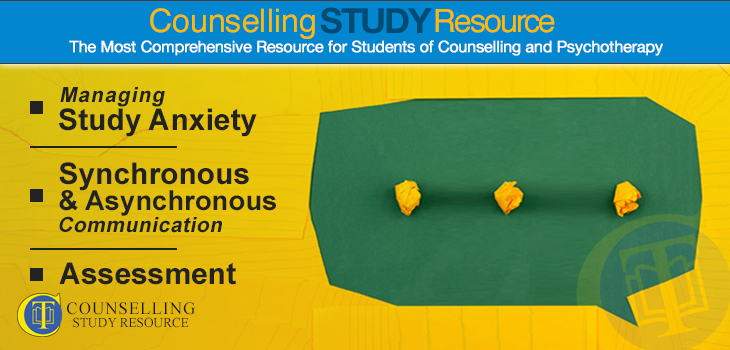161 - Synchronous and Asynchronous Communication in Counselling
Managing Study Anxiety - Is Assessment Misunderstood?
In episode 161 of the Counselling Tutor Podcast, Ken Kelly and Rory Lees-Oakes provide tips on how to manage the anxiety that you may naturally be feeling at the prospect of starting the new academic year. 'The Digital Counselling Revolution' then looks at synchronous and asynchronous communication in counselling - what these are and the various pros and cons of each.
Last, in 'Practice Matters', the presenters discuss counselling assessment, with reference to this lecture here in Counsellor CPD.
Managing Study Anxiety (starts at 1.30 mins)
Ken recalls his feelings of anxiety when beginning his counselling studies, even in more 'normal' times.
Indeed, many students of counselling and psychotherapy may be returning to study after a gap in education; in this situation, it is very natural to feel self-doubt and a lack of confidence.
With all the changes to counselling training that have come about as a result of the COVID-19 situation (see podcasts 159 and 160), it's no wonder that anxiety levels may be even higher. This is evident in recent posts in the Counselling Tutor Facebook group.
Ken and Rory provide some hints on how to manage your anxiety in this situation:
- Focus on self-care, making sure you spend some time doing things that you find relaxing. What exactly these activities are will vary between people.
- For Rory, getting out for a walk is really helpful - and spending time in nature is an effective form of relaxation for many people.
- Ken describes his use of mindfulness and meditation as a way to start his day in a calm way. Again, this is widely considered helpful for greater self-awareness and serenity.
- Remember too that anxiety can be contagious - might you be picking up on other people's anxiety rather than truly feeling your own? It can help to reflect on this, to try to separate the two, and to rationalise your own anxieties.
- Most important of all, don't hide and bottle up your anxiety - instead, speak about it with others who will understand, for example your peers on your course. The Counselling Tutor Facebook group is also a great place to do this. Feeling less alone with your feelings can really help dissipate them.
Don't forget that it is not selfish to self-care - if we look after ourselves, we become better able to help others.
Synchronous and Asynchronous Communication in Counselling (starts at 16.45 mins)
The digital revolution in the world of counselling and psychotherapy offers a range of ways of communicating with clients. These can be divided into synchronous and asynchronous methods.
In brief, synchronous communication is real-time communication, while asynchronous communication is delayed-time communication.
So when Ken and Rory are speaking with each other on the podcast, they are in synchronous communication. Asynchronous communication would take the form of, for example, emailing or text messaging.
Rory describes the history of asynchronous communication and how it has always been more complex to handle, even leading to a breakdown in the relationship between Sigmund Freud and Carl Gustav Jung, whose letters to each other became increasingly bitter over the period of their correspondence (1906-1913). This perhaps reflects the disinhibition effect too.
In asynchronous communication, the emotion behind the writing of the other party is harder to pick up, and it is easier to reply in a way that is inadvertently ambiguous.
Reading back over our reply before sending it is always a good idea - and in some ways gives us more chance than in synchronous communication to phrase our response just right.
Whether or not asynchronous counselling would be helpful for you depends at least partly on your own ease with the written word. For example, it may not be a good choice for someone with dyslexia.
If counselling asynchronously, it can also be a good idea to prepare for this by discussing with the client the possibility of misunderstandings, and to make it clear that you are open to receiving feedback.
Is Assessment Misunderstood? (starts at 29.05 mins)
In this part of the Counselling Tutor Podcast - aimed at supporting qualified practitioners to sharpen their competence - Rory and Ken talk about the importance of assessment.
For counsellors who are newly qualified or entering private practice, it can be sensible to seek specific training on assessment. The first stage of all in this process is to examine your own relationship with the process of assessment.
Rory looks at the history of assessment, including Carl Rogers' focus on this.
You are also signposted to a specialist lecture by psychologist John Mellor-Clark, who is the Managing Director of CORE Information Management Systems (CORE IMS), and also serves as Visiting Professor at the Centre for Community Mental Health, Birmingham City University.
In this, John explores the use of outcome questionnaires in therapy using the CORE Outcome Measure as an example.


